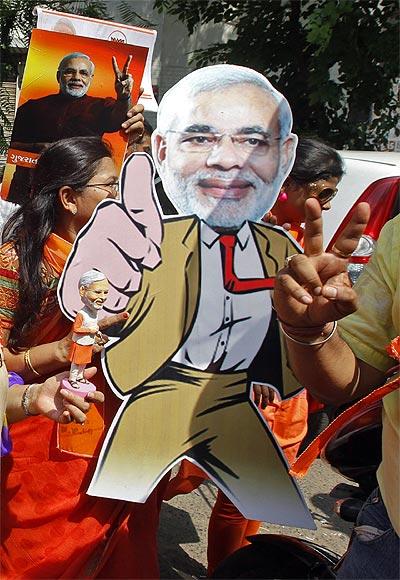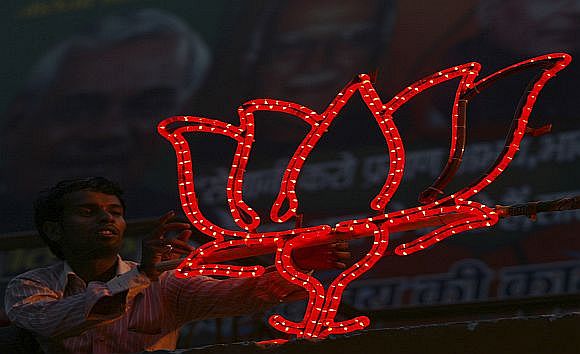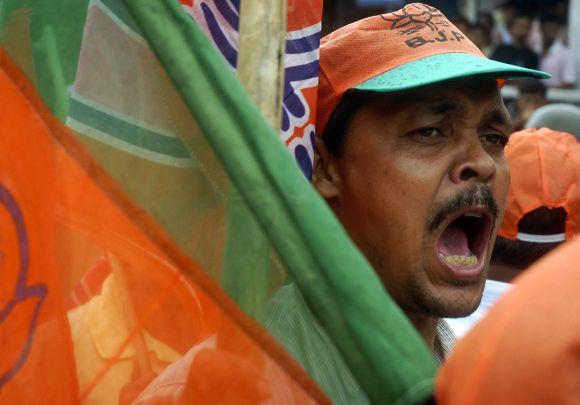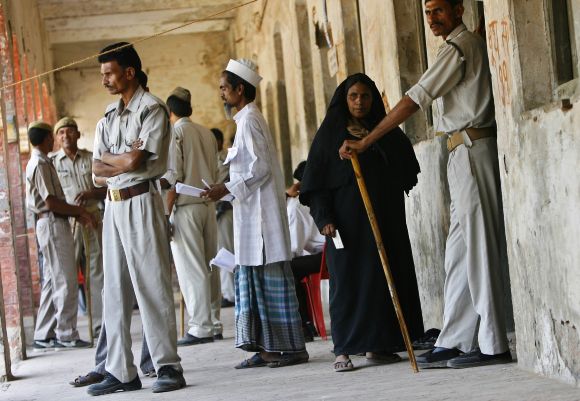
Try as hard as the BJP might to whitewash or sugar-coat its Muslim-centric gestures, one cannot deny that they smack of appeasement. There is a real danger in this misguided approach. The BJP may end up looking like a poor B team of the Congress with disastrous results. In the real world people prefer originals not imitations, says Vivek Gumaste.
Political power is a heady intoxicating elixir; a femme fatale of sorts that can seduce you, enchant you and compel even the most robust of individuals or parties to resort to questionable short-cuts or to stray from one’s avowed tenets in one’s gubernatorial bid.
Accordingly one discerns a hint of a moral compromise in the context of the Bharatiya Janata Party’s bid for power in 2014: a kowtowing that is at odds with its image as a principled party with a difference.
Is the party succumbing to temptation? Is the BJP diluting its core values to chalk out what it assumes will be a more facile path to power? And can these subtle and not so subtle paeans blow up in its face by provoking a counterproductive backlash from its own faithful?
These are the medley of questions swirling in the air vis-à-vis the BJP’s recent blitzkrieg that aims to placate the Muslim community.
...

First, ahead of the assembly elections in Delhi, BJP’s state president Vijay Goel rolled out a long list of sops. At the Talkatora Stadium on June 23, he proclaimed : “BJP’s agenda for Muslims in Delhi includes upgrading education facilities… greater employment… training and credit facilities, adequate share in housing schemes…. and professional management of Wakf Board, Delhi Haj Committee, Urdu Academy and Minority Development Financial Corporation.”
Leading the BJP’s Delhi campaign is a fawning slogan that does little credit to its claim of impartiality: "Jo Musalmaan ka vikas karega, wohi desh par raj karega" (the one who will work for the upliftment of Muslims will rule the country).
And on June 26, the BJP sanctioned with much fanfare a 'Vision Document for Empowerment of Minorities.' This was followed by a high profile youth conclave in Ahmedabad which had Narendra Modi, the BJP’s prime ministerial candidate in the chair; the audience consisted of 200 special invitees of which at least 30 were Muslims.
Are the BJP’s rapprochement initiatives ethically incompatible? The answer is ambivalent. An attempt to accommodate different sections of India’s diverse population is a welcome move and a prerogative of every political party. But this exercise must be driven primarily by need; a focus that is not qualified by the colour, caste or religion of the citizen.

The BJP must appeal to Muslims as Indians first and Muslims second; not the other way around. That is where the problem lies.
Try as hard as the BJP might to whitewash or sugar-coat its Muslim centric gestures, one cannot deny that they smack of appeasement: that very obnoxious trait the BJP has charged its opponents with; a move that violates its own basic tenet of ‘appeasement for none.’
There is a real danger in this misguided approach. The BJP may end up looking like a poor B team of the Congress with disastrous results. In the real world people prefer originals not imitations.
At the outset, it makes eminent electoral sense to court the Muslim community that accounts for close to 15- 20 percent of the population. However, to craft an electoral strategy based purely on mathematical numbers without appreciating the Muslim psyche or factoring in an analysis of past election results is simplistic and misconceived. In fact the BJP’s current approach is based on erroneous assumptions not in concert with ground reality.
To elucidate this issue, let me pose two questions:
First, can the BJP sway Muslim voters with this notable course correction? The response is in the negative for similar measures have failed to produce the desired results in the past.

In the run up to the 2004 Lok Sabha elections, the then prime minister, Atal Bihari Vajpayee at an election meeting in the predominantly Muslim constituency of Kishanganj in Bihar promised to recruit two lakh Urdu teachers and earmarked Rs 74 crore for madrasa students.
Subsequent to the 2004 debacle and in preparation for the 2009 polls, L K Advani tried to recast himself into a supposedly more acceptable image by making a trip to Pakistan, the highlight of which was a grandiose eulogy to M A Jinnah’s secularism.
Both these reconciliatory moves came up as croppers: the BJP lost both the 2004 and 2009 elections. The BJP must realise that efforts to win over the Muslim community is a futile exercise and abandon such a proposition.
Overlooked in theses electoral fiascoes was a more important factor: alienation of the BJP’s core constituency stemming from its moral divergence; a phenomenon that could possibly repeat itself in 2014. The BJP must be wary.
Can Muslims voting en bloc derail the BJP’s bid for power?
The concept of Muslims voting en bloc is a myth or even if they do, it is unlikely to change the BJP’s electoral fortunes as exemplified by the results of the 1996 and 1998 elections when Muslim angst was at its peak. G L V Narasimha Rao the psephologist writes:
In the 1996 Lok Sabha elections, held three years after Babri demolition, the BJP bagged 52 of 85 seats in Uttar Pradesh. Again, in 1998, the BJP bagged 57 seats. If vehement opposition from Muslims and their tactical voting against the BJP could defeat the BJP, it could not have performed well in UP in both these elections. (The Organiser, July 1, 2012)
So does this mean that the BJP should ignore the Muslim community? Obviously not. So what should be its approach?
Jiten Gajaria a former co-convenor of the BJP’s intellectual cell in Maharashtra rightly points out:
“The BJP just needs to continue the all-inclusive development mantra… This mantra does not discriminate and treats everyone as an individual and not as a section… Like in every democracy, the BJP has to appeal to every individual to get his/her vote. And this will include the Muslim community…” (Rediff, July 3, https://www.rediff.com/news/column/view-bjp-offers-muslims-same-things-it-offers-other-indians/20130703.htm)
The BJP should not swerve from its guiding principle of ‘Justice for All, Appeasement of None’ for in that lies its success and the success of India as a genuine pluralistic democracy.
...